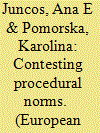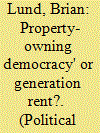| Srl | Item |
| 1 |
ID:
180559


|
|
|
|
|
| Summary/Abstract |
While there is increasing evidence in the literature of politicisation in the area of European foreign policy, we know less about how this has affected the dynamics of cooperation among EU member states and, specifically, the procedural norms that govern this policy. This article is concerned with how politicisation and contestation manifest at the micro-level and how they might shape everyday EU foreign policy negotiations. It seeks to establish to what extent politicisation – resulting from the emergence of a new political cleavage centred around issues of identity and supranational integration – has driven normative contestation within EU foreign policy negotiations and whether this has led to the erosion of long-standing procedural norms in European foreign policy. Our findings suggest that despite CFSP Council committees being an institutional arena, characterised by intergovernmental, relatively insulated, and technical decision-making, current processes of politicisation linked to the rise of populism and the increasing transfer of authority to the EEAS have increased contestation of norms within this setting. However, procedural norms have remained relatively resilient to these challenges.
|
|
|
|
|
|
|
|
|
|
|
|
|
|
|
|
| 2 |
ID:
122466


|
|
|
|
|
| Publication |
2013.
|
| Summary/Abstract |
A property owning democracy' has been at the centre of Conservative Party social policy since Noel Skelton coined the phrase in 1924. The idea has been underpinned by contrasting the independent, hygienic, suburban homeowner with the urban, managed, flat-dwelling, high-density council tenant. No Conservative-led government has left office with a homeownership rate lower than when it came to power and the right to buy has enabled this growth to be maintained. However, in 2005, homeownership started to decline and this drop has continued into the Coalition government's term of office with more households now exiting owner-occupation into the private landlord sector than entering owner-occupation from private renting. The 'reinvigorating' the right to buy is an attempt put a 'property owning democracy' back on track but, should it fail, the Conservative Party may turn to more radical policies such as sale on vacant possession of 'high value' local authority and housing association houses.
|
|
|
|
|
|
|
|
|
|
|
|
|
|
|
|